In a comprehensive new study spearheaded by researchers at the University of Southampton, an urgent call has been made to address stark disparities in global cancer research funding. The study, which meticulously analyzes public and philanthropic investments from 2016 to 2023, reveals a troubling concentration of resources in high-income countries, while lower-income regions — often bearing a disproportionately heavy cancer burden — receive minuscule support. This imbalance threatens not only the equitable advancement of cancer treatment worldwide but also the efficacy of healthcare systems struggling under the weight of increasing cancer incidence in economically disadvantaged settings.
Cancer remains a formidable global health challenge, accounting for approximately one in five deaths worldwide, yet investment in research to combat this disease is unevenly distributed. According to the study’s lead author, Dr. Michael Head of the University of Southampton, “Inequalities in investment across nations and underfunding of specific treatment areas undermine our ability to confront the full spectrum of cancer challenges effectively.” This imbalance risks perpetuating a cycle where certain cancers, notably those prevalent in wealthier nations, receive extensive research attention, while those affecting low-income countries remain neglected.
Utilizing cutting-edge methodologies, including machine learning algorithms and advanced natural language processing models, the research team scrutinized over 107,000 cancer research grants amounting to a staggering $51.4 billion globally. The datasets, spanning two distinct periods (2016–2020 and 2021–2023), were rigorously examined to draw a detailed portrait of funding flows and their geographic and thematic distributions. This data-driven approach, elevated by expert validation, allowed for nuanced insights into both where and how cancer research dollars are deployed.
Geographically, the United States stands as the largest single contributor, injecting nearly $29.3 billion — roughly 57% of the global total — into cancer research. The Commonwealth countries collectively provided $8.7 billion, with the United Kingdom leading at $5.7 billion, followed by Australia and Canada. However, the majority of these funds predominantly circulate within these affluent nations themselves, with negligible portions trickling to lower-income Commonwealth members or other economically challenged countries. Such funding patterns exacerbate global inequities in research capacity and, ultimately, cancer-related outcomes.
Most strikingly, low-income countries receive less than 0.1% of the total cancer research awards, a mere $8.4 million. This paltry figure starkly contrasts with the escalating cancer incidence rates documented in these regions—a phenomenon attributed to factors such as demographic shifts, urbanization, and changing lifestyles. The deficit in research investment undermines the development of contextually relevant interventions and constrains the growth of local scientific talent and infrastructure crucial for sustainable health improvements.
Beyond geographic disparities, the study highlights thematic imbalances in research focus. An overwhelming 76% of funding targets pre-clinical or laboratory-based science, areas critical to understanding molecular mechanisms and potential drug targets. Furthermore, breast cancer, blood cancers, and clinical trials for novel therapies receive considerable attention, respectively accounting for 10%, 9%, and 7% of all funding. These investment patterns, while advancing biomedical knowledge, may inadvertently marginalize essential treatment modalities.
In particular, cancer surgery and radiotherapy research are alarmingly underfunded, receiving only 1.7% and 3.1% of total research investments, respectively. This neglect is deeply concerning given the pivotal role these treatments play in comprehensive oncologic care. Surgical intervention and radiotherapy underpin curative approaches for a broad array of malignancies, often delivering immediate patient benefits. The underinvestment in these areas suggests a potential misalignment between research priorities and frontline clinical realities, underscoring the need for strategic recalibration.
Temporal trends in funding also paint a complex picture. Following a pronounced spike in 2021, global cancer research investment has shown an overall decline on an annual basis. Commonwealth countries mirror this downward trajectory, raising questions about the sustainability of current funding models. Meanwhile, the BRICS nations—Brazil, Russia, India, China, and South Africa—experienced growth in research investment until 2018, only to witness subsequent reductions. Conversely, the European Union demonstrates an uptick in funding post-2021, highlighting regional divergence in financial commitment.
Dr. Anbang Du, a co-lead author, emphasizes the necessity of scaling targeted investments and strengthening local research capacities to bridge these divides. “Without coordinated efforts to mobilize funding, develop infrastructure, and foster partnerships, these inequalities will not only persist but deepen. Entities like the Commonwealth can play a pivotal role in orchestrating sustained collaborations that democratize cancer science and its benefits globally,” he asserts. This vision advocates for a concerted, multinational strategy to ensure that advances in cancer research translate into patient outcomes everywhere, especially in resource-limited settings.
The study’s collaborative nature, involving institutions such as Queen’s University Belfast, Harvard University, Imperial College London, and the University of Health and Allied Sciences in Ghana, reinforces the global imperative to address these challenges collectively. By integrating diverse expertise and perspectives, the research exemplifies the kind of cross-border partnership necessary to contend with the multifaceted nature of cancer and its socioeconomic determinants.
By illuminating the stark funding disparities and thematic gaps in cancer research globally, the study provides vital evidence to policymakers, funders, and the scientific community. Bridging these gaps demands not only reallocating resources but also fostering sustainable environments where local researchers can drive innovation tailored to their regions’ unique cancer profiles. Such an equitable, inclusive approach promises to enhance global cancer control and reduce the disproportionate burden borne by the world’s most vulnerable populations.
As the cancer research community reflects on these findings, the call to action is clear: a reimagined global research paradigm that widens participation, balances funding across therapeutic domains, and prioritizes under-resourced regions is indispensable. Only through such systemic transformation can the promise of cancer science be realized universally, translating discovery into hope and survival for millions worldwide.
Subject of Research: People
Article Title: Public and philanthropic research funding, publications and research networks for cancer in the Commonwealth and globally in 2016-2023: comparative analysis
News Publication Date: 1-Sep-2025
Web References: http://dx.doi.org/10.1016/S1470-2045(25)00338-9
Keywords: Cancer research, Cancer treatments




